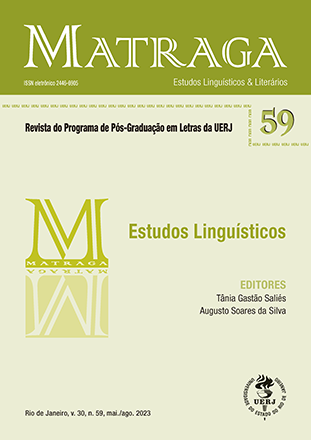Discourse space and proximization in brazilian neoconservative discourse: combining cognitive linguistics and critical discourse studies
DOI:
https://doi.org/10.12957/matraga.2023.74294Keywords:
Construal, Cognitive Linguistics, Critical Discourse Studies, Discourse Space, Proximization.Abstract
This paper aims to discuss how the study of spatial, temporal, epistemic and axiological positioning, distance and movement in the discourse space can be productive for the cognitive-discursive analysis of the legitimation and mobilization of social action. To do so, we initially discuss the theoretical grounding of the Cognitive Linguistic approach to Critical Discourse Studies (GONÇALVES-SEGUNDO, 2014; 2017; HART, 2014), the concept of discourse space (CHILTON, 2004) and its further developments into the Proximization Theory (CAP, 2013; HART, 2014). Subsequently, we apply the tools of this theoretical and methodological construct to analyze three instances of the contemporary Brazilian neoconservative discourse. We focus our attention on a particular form of anticommunist stance: the representation of the advancement of the left (their agenda, their ideas, their policies) as a form of legitimizing a military intervention through the support of the people. As a result, we detected that this legitimization effort encompassed, primarily, temporal and axiological proximization and, only secondarily, spatial and epistemic proximization.
Downloads
Downloads
Published
How to Cite
Issue
Section
License
Authorization
Matraga – Scientific Journal of the Post-graduate Program in Arts and Humanities of UERJ is authorized to publish the article submitted here, if it is accepted for online publication. It is attested that the contribution is original, that it is not being submitted to another publisher for publication, and that this statement is the expression of truth.
The works published in Matraga's virtual space – Scientific Journal of the Post-graduate Program in Arts and Humanities of UERJ will be automatically transferred, and your copyright is reserved to Matraga. Its reproduction, in whole or in part, is conditional on the citation of the authors and the data of the publication.

Matraga uses license Creative Commons - Attribution-Non-Commercial 4.0 International.





